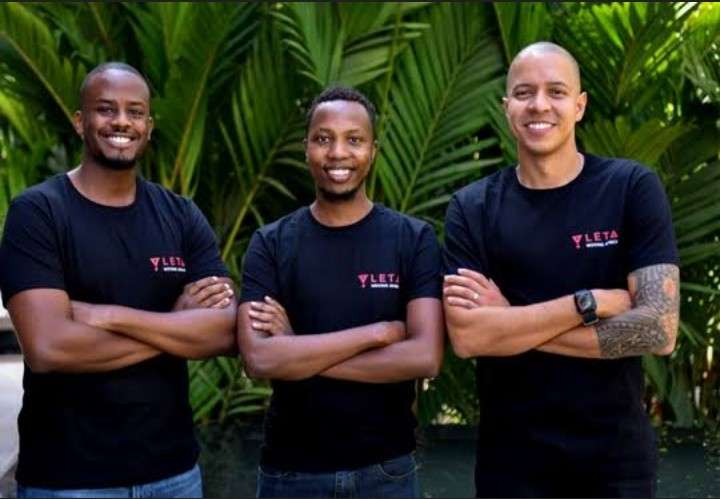From Nairobi, Kenya, a logistics technology startup, Leta has launched operations in Ghana, marking its seventh active market in sub-Saharan Africa, as it accelerates its mission to revolutionize goods transportation across the continent.
The expansion comes after a $5 million seed funding round in March 2025, led by European venture firm Speedinvest, with backing from Google’s Africa Investment Fund and Nairobi-based Equator VC.
Leta’s entry into Ghana kicks off with Simbisa Brands Limited, one of Africa’s largest fast food operators with over 600 outlets in 11 countries, onboard as its first local customer in Accra.
“This marks a major step in our journey to become the operating system for logistics across Africa,” said Leta CEO and founder Joshi D.
The Nairobi-headquartered firm provides AI-powered logistics solutions to optimize supply chains, reduce costs, and cut carbon emissions.
Its platform helps businesses automate delivery route planning, track goods in real time, streamline logistics payments, and analyze shipment data to inform smarter decisions.
Leta’s technology is tailored for markets where inefficient delivery systems and fragmented transport networks continue to inflate operational costs for manufacturers, distributors, and retailers.
“Africa doesn’t have a logistics problem, it has a logistics coordination problem. Leta is solving that,” noted a Speedinvest partner during the funding announcement.
What does Leta do?
At the heart of Leta’s offering is an artificial intelligence-driven platform designed to overhaul traditional logistics processes.
The system enables dynamic route optimization, helping drivers avoid delays and reduce fuel usage, while giving companies full visibility into their supply chain through GPS-enabled vehicle tracking.
The platform also manages digital payments and integrates data analytics to help logistics teams forecast demand, measure delivery performance, and optimize vehicle utilization.
For regions struggling with supply inefficiencies and rising fuel prices, Leta offers a scalable solution that blends cost-effectiveness with sustainability.
“Our technology is built for the realities of African roads, costs, and business cycles,” Joshi D added.
What has Leta achieved so far?
In just under three years, as gathered by Techparley, Leta has delivered measurable impact. The startup reports a 5X growth in revenue since its pre-seed round in 2022 and has facilitated over 4.5 million deliveries across six countries prior to its Ghana launch.
The company has moved more than 150,000 tonnes of goods and manages a fleet of 7,400 vehicles across its platform.
Among its clients are regional giants like KFC, East African Breweries Limited (EABL), Fargo Courier, and Gilani’s Supermarket, all of whom leverage Leta’s tech to slash operational costs and improve delivery timelines. A logistics coordinator at KFC Uganda said,
“Since integrating with Leta, we’ve seen delivery accuracy jump by 30%, and operational delays cut in half.”
How’s Leta Growing: Founding, Funding, and Expansions?
Founded by entrepreneur Joshi D in 2022, Leta quickly gained traction for its ambitious, tech-first approach to one of Africa’s most complex logistical challenges.
The company closed its $5 million seed round in March 2025, showcasing investor confidence in the growing market for supply chain optimization tools in Africa. Key funders include Speedinvest, Google’s Africa Investment Fund, and Equator VC.
“We’re backing Leta because it’s addressing a foundational inefficiency that affects everything from food prices to access to medicine,” said a spokesperson for Equator VC.
With this capital, Leta is enhancing its product capabilities and expanding into high-demand African markets.
Prior to Ghana, Leta had rolled out operations in Kenya, Uganda, Nigeria, Zambia, Zimbabwe, and Mauritius, building what it calls a “pan-African logistics network” that prioritizes efficiency and environmental sustainability.
“We envision an Africa where logistics no longer hinders growth, it powers it,” Joshi emphasized.
Why this matters
Leta’s expansion comes at a critical time for African economies, many of which are grappling with rising inflation, poor infrastructure, and high logistics costs.
According to the World Bank, supply chain inefficiencies can increase consumer prices by as much as 40 percent in parts of sub-Saharan Africa. By leveraging AI and real-time data, Leta is offering African businesses a path toward modern, cost-effective logistics systems that rival global standards.
Its ability to deliver tangible results, cutting fuel costs, shortening delivery times, and reducing emissions, positions Leta as a model for how African startups can tackle systemic challenges through technology.
“Logistics is the invisible lifeblood of every economy. Fix it, and everything else moves faster,” said a Nairobi-based supply chain analyst.
With Ghana now in its portfolio, Leta’s pan-African ambition is no longer just aspirational, it’s operational.
Talking Point
Leta’s expansion into Ghana and its rapid growth across seven African markets is a commendable achievement. It signifies how homegrown innovation can tackle deep-rooted logistical inefficiencies through AI-powered solutions that cut costs, reduce emissions, and boost delivery performance.
Backed by global investors like Google and Speedinvest, the startup has proven that African tech can scale while delivering real impact.
However, to maximize its influence, Leta should deepen collaboration with public infrastructure players and invest in local talent development to ensure sustainable, inclusive growth.
Ultimately, Leta’s success reflects a rising wave of African startups solving systemic problems with technology, offering both a blueprint and a challenge for governments and industries to rethink logistics as a catalyst for economic transformation.





